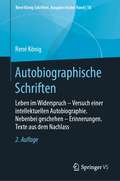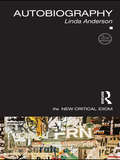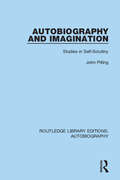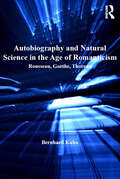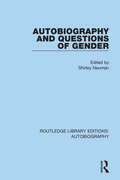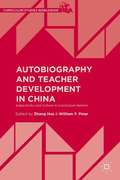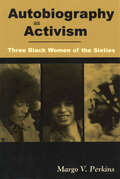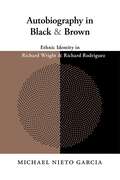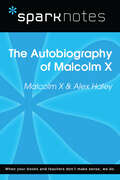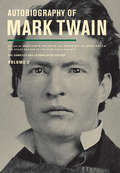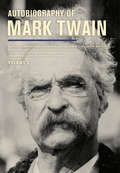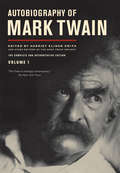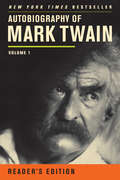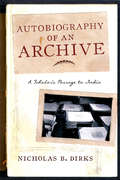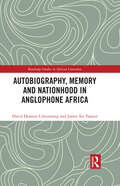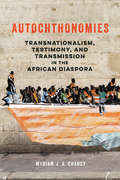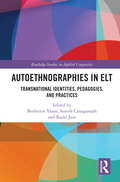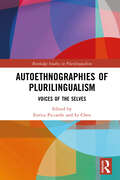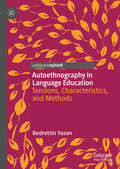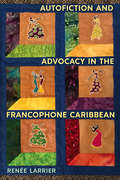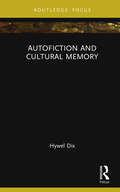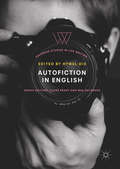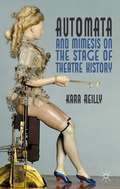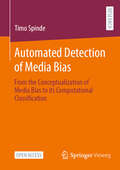- Table View
- List View
Autobiographische Schriften: Leben im Widerspruch Versuch einer intellektuellen Autobiographie. Nebenbei geschehen Erinnerungen. Texte aus dem Nachlass (René König Schriften. Ausgabe letzter Hand #18)
by René KönigGeboren im Kaiserreich, aufgewachsenen in der Weimarer Republik, geprägt vom Widerstand gegen den Nationalsozialismus und den Jahren der Emigration in der Schweiz, kehrte René König 1953 nach Deutschland zurück und wurde zu einem der Wiederbegründer der deutschen Soziologie. Die 1980 zuerst veröffentlichte Autobiographie "Leben im Widerspruch" beschreibt die einzelnen Etappen dieses Lebensweges, die Schulzeit in Danzig mit seinem polnischen Hinterland, die Studienjahre in Wien, Berlin und Paris und die vielfältige Tätigkeit als akademischer Lehrer in Europa, Amerika und Asien, die Reisen des jungen Studenten in die Länder des Nahen Ostens, die Begegnung mit der Kultur Siziliens, Erfahrungen als Betreuer eines bundesdeutschen Entwicklungshilfeprojektes in Afghanistan und die Auseinandersetzung mit den indianischen Kulturen im Südwesten der USA. Der zweite, bisher unveröffentlichte Text entstammt einer im Nachlass befindlichen unvollendeten Autobiographie, die mehr persönlich gehalten werden sollte und den Charakter von "Erinnerungen" hat. An ihr hat René König bis ungefähr 1990 gearbeitet. Der Titel "Nebenbei geschehen" stammt von ihm. Behandelt werden in diesen Kapiteln die Lebensabschnitte in Danzig, Berlin und in Zürich.
Autobiography (The New Critical Idiom)
by Linda AndersonIf every writer necessarily draws on their own life, is any writing outside the realm of ‘autobiography’? The new edition of this classic guide is fully updated to include: developments in autobiographical criticism, highlighting major theoretical issues and concepts different forms of the genre from confessions and narratives to memoirs and diaries uses of the genre in their historical and cultural contexts major autobiographical writers including St Augustine, Bunyan, Boswell, Rousseau and Wordsworth, alongside non-canonical autobiographies by women twentieth-century autobiography including women's writing, black and postcolonial writing, and personal criticism a new chapter on narrative and new material examining recent trends in autobiography such as blogs, the popularity of literary memoirs and recent developments in theory on testimonial writing. Combining theoretical discussion with thought-provoking readings of major texts, this is the ideal introduction to the study of a fascinating genre.
Autobiography and Imagination: Studies in Self-scrutiny (Routledge Library Editions: Autobiography #8)
by John PillingOriginally published in 1981. This book looks at the autobiographical work of nine twentieth-century writers – Henry Adams, Henry James, W. B. Yeats, Boris Pasternak, Leiris, Jean-Paul Sartre, Vladimir Nabokov, Henry Green and Adrian Stokes. The author argues that often the writer has shaped his life through his craft, coming to understand the pattern of his own existence through the formalism of language. In each case the writer stamps his personality on the work by mean of a distinctive verbal surface whose discipline enables him to evade narrow egotism and forces both reader and writer into an act of collaboration and corroboration. Written at a time when criticism was turning to focus on the relation between the reader and the text, this study added a provocative dimension to the debate and is still an important read today.
Autobiography and Natural Science in the Age of Romanticism: Rousseau, Goethe, Thoreau
by Bernhard KuhnSet against the backdrop of a rapidly fissuring disciplinary landscape where poetry and science are increasingly viewed as irreconcilable and unrelated, Bernhard Kuhn's study uncovers a previously ignored, fundamental connection between autobiography and the natural sciences. Examining the autobiographies and scientific writings of Rousseau, Goethe, and Thoreau as representative of their ages, Kuhn challenges the now entrenched thesis of the "two cultures." Rather, these three writers are exemplary in that their autobiographical and scientific writings may be read not as separate or even antithetical but as mutually constitutive projects that challenge the newly emerging boundaries between scientific and humanistic thought during the Romantic period. Reading each writer's life stories and nature works side by side-as they were written-Kuhn reveals the scientific character of autobiographical writing while demonstrating the autobiographical nature of natural science. He considers all three writers in the context of scientific developments in their own times as well as ours, showing how each one marks a distinctive stage in the growing estrangement of the arts and sciences, from the self-assured epistemic unity of Rousseau's time, to the splintering of disciplines into competing ways of knowing under the pressures of specialization and professionalization during the late Romantic age of Thoreau. His book thus traces an unfolding drama, in which these writers and their contemporaries, each situated in an intellectual landscape more fragmented than the last, seek to keep together what modern culture is determined to break apart.
Autobiography and Questions of Gender (Routledge Library Editions: Autobiography #6)
by Shirley NeumanOriginally published in 1991. Addressing the ways in which the ideology of gender and its social construction determine autobiographical self-representations, the essays here consider several women’s works in the light of the social and historical conditions which enabled their production. Some examine diaries as a feminine form and ask about the ways in which thematic content such as childbirth can or cannot be represented in diaries and public discourse at different historical junctures. Others show the pressures of gender roles and how they have led to new genres in which self-representation is often a refraction of the representation of others. With the tools of gender theory, the representation of hermaphroditism, masculinity and male bodies is analysed and the ways in which gender intersects with racial, sexual and class ideologies is also looked at, in seeing autobiography as a form of agency in self-construction.
Autobiography and Teacher Development in China
by William F. Pinar Zhang HuaAutobiography and Teacher Development in China investigates the roles of autobiography in teacher education, as several scholars in China recontextualize Western conceptions of teacher development, combining them with uniquely Chinese cultural conceptions to articulate a reconceptualization of teacher development that holds worldwide significance. Framed by the work of Zhang Hua and William F. Pinar, these theoretical and practical essays point to an internationally inflected reconceptualization of teachers' professional development, pre-service and in-service. This volume addresses multiple movements of teacher education reform worldwide, focused on crafting a nationally distinctive course not only internationally, but also culturally, historically, and locally.
Autobiography as Activism: Three Black Women of the Sixties
by Margo V. PerkinsAngela Davis, Assata Shakur (a.k.a. JoAnne Chesimard), and Elaine Brown are the only women activists of the Black Power movement who have published book-length autobiographies. In bearing witness to that era, these militant newsmakers wrote in part to educate and to mobilize their anticipated readers. In this way, Davis's Angela Davis: An Autobiography (1974), Shakur's Assata (1987), and Brown's A Taste of Power: A Black Woman's Story (1992) can all be read as extensions of the writers' political activism during the 1960s. Margo V. Perkins's critical analysis of their books is less a history of the movement (or of women's involvement in it) than an exploration of the politics of storytelling for activists who choose to write their lives. Perkins examines how activists use autobiography to connect their lives to those of other activists across historical periods, to emphasize the link between the personal and the political, and to construct an alternative history that challenges dominant or conventional ways of knowing. The histories constructed by these three women call attention to the experiences of women in revolutionary struggle, particularly to the ways their experiences have differed from men's. The women's stories are told from different perspectives and provide different insights into a movement that has been much studied from the masculine perspective. At times they fill in, complement, challenge, or converse with the stories told by their male counterparts, and in doing so, hint at how the present and future can be made less catastrophic because of women's involvement. The multiple complexities of the Black Power movement become evident in reading these women's narratives against each other as well as against the sometimes strikingly different accounts of their male counterparts. As Davis, Shakur, and Brown recount events in their lives, they dispute mainstream assumptions about race, class, and gender and reveal how the Black Power struggle profoundly shaped their respective identities.
Autobiography in Black and Brown: Ethnic Identity in Richard Wright and Richard Rodriguez
by Michael Nieto GarciaRichard Wright was the grandson of slaves, Richard Rodriguez the son of immigrants. One black, the other brown, each author prominently displays his race in the title of his autobiography: Black Boy and Brown. Wright was a radical left winger, while Rodriguez is widely viewed as a reactionary. Despite their differences, Michael Nieto Garcia points out, the two share a preoccupation with issues of agency, class struggle, ethnic identity, the search for community, and the quest for social justice. Garcia&’s study, the first to compare these two widely read writers, argues that ethnic autobiography reflects the complexity of ethnic identity, revealing a narrative self that is bound to a visible ethnicity yet is also protean and free.These autobiographies, according to Garcia, exemplify the tensions and contradictions inherent in identity. In their presentation of the self we see the rejection not only of essentialized notions of ethnic authenticity but also of any conception of an ethnic self that is not also communally derived. The image reflected in the mirror of autobiography also reminds us that consciousness itself is altered by our reading, and that the construction of modern ethnicity is shaped to a considerable extent by print culture.
Autobiography of Malcolm X (SparkNotes Literature Guide Series)
by SparkNotesAutobiography of Malcolm X (SparkNotes Literature Guide) by Malcolm X and Alex Haley Making the reading experience fun! Created by Harvard students for students everywhere, SparkNotes is a new breed of study guide: smarter, better, faster.Geared to what today's students need to know, SparkNotes provides:chapter-by-chapter analysis explanations of key themes, motifs, and symbols a review quiz and essay topicsLively and accessible, these guides are perfect for late-night studying and writing papers.
Autobiography of Mark Twain, Volume 2
by Mark Twain Victor Fischer Benjamin Griffin Michael Barry Frank Ms Harriet E. SmithMark Twain's complete, uncensored Autobiography was an instant bestseller when the first volume was published in 2010, on the centennial of the author's death, as he requested. Published to rave reviews, the Autobiography was hailed as the capstone of Twain's career. It captures his authentic and unsuppressed voice, speaking clearly from the grave and brimming with humor, ideas, and opinions. The eagerly-awaited Volume 2 delves deeper into Mark Twain's life, uncovering the many roles he played in his private and public worlds. Filled with his characteristic blend of humor and ire, the narrative ranges effortlessly across the contemporary scene. He shares his views on writing and speaking, his preoccupation with money, and his contempt for the politics and politicians of his day. Affectionate and scathing by turns, his intractable curiosity and candor are everywhere on view. Editors: Benjamin Griffin and Harriet E. Smith Associate Editors: Victor Fischer, Michael B. Frank, Sharon K. Goetz and Leslie Diane Myrick
Autobiography of Mark Twain, Volume 3
by Mark Twain Benjamin Griffin Ms Harriet E. SmithThe surprising final chapter of a great American life. When the first volume of Mark Twain's uncensored Autobiography was published in 2010, it was hailed as an essential addition to the shelf of his works and a crucial document for our understanding of the great humorist's life and times. This third and final volume crowns and completes his life's work. Like its companion volumes, it chronicles Twain's inner and outer life through a series of daily dictations that go wherever his fancy leads. Created from March 1907 to December 1909, these dictations present Mark Twain at the end of his life: receiving an honorary degree from Oxford University; railing against Theodore Roosevelt; founding numerous clubs; incredulous at an exhibition of the Holy Grail; credulous about the authorship of Shakespeare's plays; relaxing in Bermuda; observing (and investing in) new technologies. The Autobiography's "Closing Words" movingly commemorate his daughter Jean, who died on Christmas Eve 1909. Also included in this volume is the previously unpublished "Ashcroft-Lyon Manuscript," Mark Twain's caustic indictment of his "putrescent pair" of secretaries and the havoc that erupted in his house during their residency. Fitfully published in fragments at intervals throughout the twentieth century, Autobiography of Mark Twain has now been critically reconstructed and made available as it was intended to be read. Fully annotated by the editors of the Mark Twain Project, the complete Autobiography emerges as a landmark publication in American literature. Editors: Benjamin Griffin and Harriet Elinor Smith Associate Editors: Victor Fischer, Michael B. Frank, Amanda Gagel, Sharon K. Goetz, Leslie Diane Myrick, Christopher M. Ohge
Autobiography of Mark Twain: The Complete and Authoritative Edition, Vol. 1
by Mark Twain Michael B. Frank Victor Fischer Harriet E. Smith Benjamin Griffin"I've struck it!" Mark Twain wrote in a 1904 letter to a friend. "And I will give it away--to you. You will never know how much enjoyment you have lost until you get to dictating your autobiography." Thus, after dozens of false starts and hundreds of pages, Twain embarked on his "Final (and Right) Plan" for telling the story of his life. His innovative notion--to "talk only about the thing which interests you for the moment"--meant that his thoughts could range freely. The strict instruction that these texts remain unpublished for 100 years meant that when they came out, he would be "dead, and unaware, and indifferent," and that he was therefore free to speak his "whole frank mind." The year 2010 marks the 100th anniversary of Twain's death. In celebration of this important milestone and in honor of the cherished tradition of publishing Mark Twain's works, UC Press is proud to offer for the first time Mark Twain's uncensored autobiography in its entirety and exactly as he left it. This major literary event brings to readers, admirers, and scholars the first of three essential volumes and presents Mark Twain's authentic and unsuppressed voice, brimming with humor, ideas, and opinions, and speaking clearly from the grave as he intended.
Autobiography of Mark Twain: Volume 1, Reader's Edition
by Mark Twain Harriet E. SmithThe year 2010 marked the 100th anniversary of Mark Twain's death. In celebration of this important milestone and in honor of the cherished tradition of publishing Mark Twain's works, UC Press published Autobiography of Mark Twain, Volume 1, the first of a projected three-volume edition of the complete, uncensored autobiography. The book became an immediate bestseller and was hailed as the capstone of the life's work of America's favorite author. This Reader's Edition, a portable paperback in larger type, republishes the text of the hardcover Autobiography in a form that is convenient for the general reader, without the editorial explanatory notes. It includes a brief introduction describing the evolution of Mark Twain's ideas about writing his autobiography, as well as a chronology of his life, brief family biographies, and an excerpt from the forthcoming Autobiography of Mark Twain, Volume 2--a controversial but characteristically humorous attack on Christian doctrine.
Autobiography of an Archive: A Scholar's Passage to India (Cultures of History)
by Nicholas DirksThe decades between 1970 and the end of the twentieth century saw the disciplines of history and anthropology draw closer together, with historians paying more attention to social and cultural factors and the significance of everyday experience in the study of the past. The people, rather than elite actors, became the focus of their inquiry, and anthropological insights into agriculture, kinship, ritual, and folk customs enabled historians to develop richer and more representative narratives. The intersection of these two disciplines also helped scholars reframe the legacies of empire and the roots of colonial knowledge. <P><P>In this collection of essays and lectures, history's turn from high politics and formal intellectual history toward ordinary lives and cultural rhythms is vividly reflected in a scholar's intellectual journey to India. Nicholas B. Dirks recounts his early study of kingship in India, the rise of the caste system, the emergence of English imperial interest in controlling markets and India's political regimes, and the development of a crisis in sovereignty that led to an extraordinary nationalist struggle. He shares his personal encounters with archives that provided the sources and boundaries for research on these subjects, ultimately revealing the limits of colonial knowledge and single disciplinary perspectives. Drawing parallels to the way American universities balance the liberal arts and specialized research today, Dirks, who has occupied senior administrative positions and now leads the University of California at Berkeley, encourages scholars to continue to apply multiple approaches to their research and build a more global and ethical archive.
Autobiography, Memory and Nationhood in Anglophone Africa (Routledge Studies in African Literature)
by David Ekanem Udoinwang James Tar TsaaiorThis book provides an important critical analysis of the autobiographies of nine major leaders of national liberation movements in Africa. By examining their self-narratives, we can better understand how decolonisation unfolded and how activist-politicians sought to immortalise their roles for posterity. Focusing on the autobiographies of Peter Abrahams, Albert Luthuli, Ruth First and Nelson Mandela (South Africa), Nnamdi Azikiwe (Nigeria), Kenneth Kaunda (Zambia), George Mwase (Malawi), Kwame Nkrumah (Ghana), Maurice Nyagumbo (Zimbabwe), and Oginga Odinga (Kenya), the book uncovers the social and cultural forces which galvanized the anti-colonial resistance movement in African societies. In particular, the book explores the disdain for foreign domination, economic exploitation and cultural imperialism. It delves into themes of African cultural sovereignty before the colonial encounter, the disruptive presence of colonialism, the nationalist ferment against European imperial domination, the achievement of political autonomy by African nation-states and the corpus of contradictions which attended postcolonial becoming. With important insights on how these key historical figures navigated the process of self-determining nationhood in Africa, this book will be of interest to researchers of African literature, history, and politics.
Autochthonomies: Transnationalism, Testimony, and Transmission in the African Diaspora (New Black Studies Series)
by Myriam ChancyIn Autochthonomies, Myriam J. A. Chancy engages readers in an interpretive journey. She lays out a radical new process that invites readers to see creations by artists of African descent as legible within the context of African diasporic historical and cultural debates. By invoking a transnational African/diasporic lens and negotiating it through a lakou or ”yard space,” we can see such identities transfigured, recognized, and exchanged. Chancy demonstrates how the process can examine the salient features of texts and art that underscore African/diasporic sensibilities and render them legible. What emerges is a potential for richer readings of African diasporic works that also ruptures the Manichean binary dynamics that have dominated previous interpretations of the material. The result: an enriching interpretive mode focused on the transnational connections between subjects of African descent as the central pole for reader investigation. A bold challenge to established scholarship, Autochthonomies ranges from Africa to Europe and the Americas to provide powerful new tools for charting the transnational interactions between African cultural producers and sites.
Autoethnographies in ELT: Transnational Identities, Pedagogies, and Practices (Routledge Studies in Applied Linguistics)
by Suresh Canagarajah Bedrettin Yazan Rashi JainThis innovative volume showcases the possibilities of autoethnography as a means of exploring the complexities of transnational identity construction for learners, teachers, and practitioners in English language teaching (ELT). // The book unpacks the dynamics of today’s landscape of language education which sees practitioners and students with nuanced personal and professional histories inhabit liminal spaces as they traverse national, cultural, linguistic, ideological, and political borders, thereby impacting their identity construction and engagement with pedagogies and practices across different educational domains. The volume draws on solo and collaborative autoethnographies of transnational language practitioners to question such well-established ELT binaries such as ‘center’/’periphery’ and ‘native’/non-native’ and issues of identity-related concepts such as ideologies, discourses, agency, and self-reflexibility. In so doing, the book also underscores the unique affordances of autoethnography as a methodological tool for better understanding transnational identity construction in ELT and bringing to the fore key perspectives in emerging areas of study within applied linguistics. // This dynamic collection will appeal to students, scholars, and practitioners in English language teaching, applied linguistics, TESOL education, educational linguistics, and sociolinguistics.
Autoethnographies of Plurilingualism: Voices of the Selves (Routledge Studies in Plurilingualism)
by Le Chen Enrica PiccardoThis collection spotlights the authentic voices of plurilingual learners, bringing together autoethnographies of over twenty graduate students to deepen current understandings of lived experiences of plurilingualism. The volume begins with outlining foundational work on plurilingualism in language education up to this point, with the body of work on plurilingual subjectivities historically focusing on researchers’ and practitioners’ gazes, rather than students. The book moves into short autoethnographies of graduate students at the University of Toronto enrolled in a graduate education course over three years. Employing autoethnography as the primary methodology allows the space for privileging authentic voices of plurilingual learners in their own words, learners whose individual lived experiences are uniquely contextualized within the lens of plurilingual theory. The volume and diversity of perspectives showcased offer a unique window into the diversity and commonalities among plurilingual learners, offering opportunities for reflection on directions for future research. This book will be of interest to students and scholars in applied linguistics, language teaching and learning, and language education.
Autoethnography in Language Education: Tensions, Characteristics, and Methods
by Bedrettin YazanThis book presents an exploration of autoethnography in language education research as a qualitative method with the potential to decolonize language education practices and include marginalized scholars in knowledge generation. The author situates the method of autoethnography within the field, arguing that it has taken too long for autoethnography to be considered an established research method in language education in particular and in educational research in general. He then addresses tensions at the macro and micro levels of autoethnography, discusses its characteristics, and describes the processes and procedures involved in conducting autoethnographic research. This book will be of interest to graduate students and scholars in language education and related disciplines such as anthropology, communication studies, sociology, and broader educational research.
Autofiction and Advocacy in the Francophone Caribbean
by Renée Larrier"Very refreshing in the understanding of Caribbean literature . . . Succeeds in blending close readings of specific texts with a constant awareness of the larger picture. . . . From a theoretical complexity that calls on Glissant, Fanon, Ngugi, Benito-Rojo among others, this profoundly human exploration of autofiction and advocacy in Francophone Caribbean literature study does not succumb to the temptation of theory; that is, she does not demand texts illustrate a rigid theoretical frame; the reverse is true throughout the study."—Cilas Kemedjio, University of RochesterLarrier breaks new ground in analyzing first-person narratives by five Francophone Caribbean writers—Joseph Zobel, Patrick Chamoiseau, Gisele Pineau, Edwidge Danticat, and Maryse Conde—that manifest distinctive interaction among narrators, protagonists, characters, and readers through a layering of voices, languages, time, sources, and identities. Employing the Martinican combat dance—danmye—as a trope, the author argues that these narratives can be read as testimony to the legacy of slavery, colonialism, and patriarchy that denied Caribbean people their subjectivity. In chapters devoted to Zobel, Chamoiseau, Pineau, Danticat, and Conde—who come from Martinique, Guadeloupe, and Haiti—Larrier probes the presence, construction, and strategy of the first-person narrator, which sometimes shifts within the text itself. Providing a perspective different from European travel literature, these texts deliberately position the "I" as a witness and/or performer who articulates experiences ignored or misinterpreted by sojourners' more widely circulated chronicles. While not purporting to speak for others, the "I" is concerned with transmitting what he or she saw, heard, experienced, or endured, therefore disrupting conventional representations of the Francophone Caribbean. Moreover, in modeling authenticity and agency, autofiction is also a form of advocacy.
Autofiction and Cultural Memory (New Literary Theory)
by Hywel DixAutofiction and Cultural Memory breaks new ground in autofiction research by showing how it gives postcolonial writers a means of bearing witness to past cultural or political struggles, and hence of contributing to new forms of cultural memory. Most discussion of autofiction has treated it as an individualistic form, dealing with the personal growth of its authors. In doing so, it privileges narratives of private development over those of social commitment and accords with Western concepts of ownership and authorship. By contrast, Hywel Dix shows how a variety of writers outside the Western world have used the techniques of autofiction in a different way, placing themselves on the side lines of their own stories to show solidarity with struggles against imperialism and tyranny. Drawing on examples from Algeria, Ethiopia, the Caribbean, the Americas, India and Turkey, Dix presents autofiction as a form which combines the life stories of authors with the collective struggles of their societies to restore to view historical injustices that have been marginalised and forgotten. By contributing to new forms of cultural memory, autofiction raises important questions about what we choose to remember and what we value in the present. This book will be of interest to anyone working in postcolonial studies, world literature, trauma studies, autobiography, life writing or social justice.
Autofiction in English (Palgrave Studies in Life Writing)
by Hywel DixThis innovative volume establishes autofiction as a new and dynamic area of theoretical research in English. Since the term was coined by Serge Doubrovsky, autofiction has become established as a recognizable genre within the French literary pantheon. Yet unlike other areas of French theory, English-language discussion of autofiction has been relatively limited - until now. Starting out by exploring the characteristic features and definitions of autofiction from a conceptual standpoint, the collection identifies a number of cultural, historical and theoretical contexts in which the emergence of autofiction in English can be understood. In the process, it identifies what is new and distinctive about Anglophone forms of autofiction when compared to its French equivalents. These include a preoccupation with the conditions of authorship; writing after trauma; and a heightened degree of authorial self-reflexivity beyond that typically associated with postmodernism. By concluding that there is such a field as autofiction in English, it provides for the first time detailed analysis of the major works in that field and a concise historical overview of its emergence. It thus opens up new avenues in life writing and authorship research.
Automata and Mimesis on the Stage of Theatre History
by Kara ReillyThe automaton, known today as the robot, can be seen as a metaphor for the historical period in which it is explored. Chapters include examinations of Iconoclasm's fear that art might surpass nature, the Cartesian mind/body divide, automata as objects of courtly desire, the uncanny Olympia, and the revolutionary Robots in post-WWI drama.
Automated Detection of Media Bias: From the Conceptualization of Media Bias to its Computational Classification
by Timo SpindeThis Open Access book explores the automated identification of media bias, particularly focusing on bias by word choice in digital media. The increasing prevalence of digital information presents opportunities and challenges for analyzing language, with cultural, geographic, and contextual factors shaping how content is portrayed. Despite the interdisciplinary nature of media bias research across fields like linguistics, psychology, and computer science, existing work often tackles the problem from limited perspectives, lacking comprehensive frameworks and reliable datasets. The book aims to advance the field by addressing these gaps and proposing a systematic approach to media bias detection. It develops feature-based and deep-learning approaches for automated bias detection, including a BERT-based model and MAGPIE, a multi-task learning model. These methods demonstrate improved performance on established benchmarks, showcasing the potential of deep learning in detecting media bias. Finally, the author addresses the practical applications of automated bias detection, such as enhancing news reading with forewarning messages, text annotations, and political classifiers, and examines the impact of bias on social media engagement.
